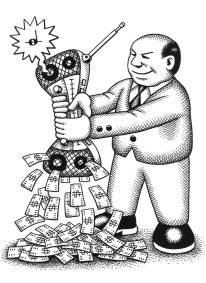« Home | Investing in the Internet property boom with Secon... »
10 Year Post-TeleCom Buildup Is A Sell Out: Old Media Now Tearing Down And Going Private Again
Labels: Jointblog In business, cashing in and cashing out is just another day at the office.
In business, cashing in and cashing out is just another day at the office.
The TeleCom Bill of 1996 was a watershed piece of legislation for media companies. Ownership rules opened up, leading to a wave of merger & acquisition and IPO never before seen. Suddenly, America's media was owned and dominated by just a few companies...and government did little to challenge or limit the buying. Media companies lobbied all kinds of promises to shareholders, audiences and advertisers, saying "bigger was better", leading to new positioning power and improved products.
Small fish were eaten by bigger fish which were eaten by even bigger fish until the chum was gone. (Literally. Bell Globemedia bought Canada's CHUM group this past summer.)
Going public was the media mantra. IPO it. Get it to Wall Street. Go make the money.
Aw, weren't the last 10 years quaint? Now, going private is the new mantra. Is it a Sarbanes-Oxley response or just purely The Street? More than a year ago, Joint Communications was one of the first media strategists to encourage media companies (especially old media) to break away from Wall Street and become private again. Since then, Emmis has pursued it. The Tribune Co. is exploring it.
Now, going private is the new mantra. Is it a Sarbanes-Oxley response or just purely The Street? More than a year ago, Joint Communications was one of the first media strategists to encourage media companies (especially old media) to break away from Wall Street and become private again. Since then, Emmis has pursued it. The Tribune Co. is exploring it.
And now, the largest radio company in the world -- Clear Channel, with $5 billion in annual total revenue -- is doing it. For a tune estimated between $16-to-$28 billion, depending on which math you use and how profitable selloffs end up. Of course, the trends that drive companies to go public or private are somewhat cyclical, but what's new in the media space this time around is private equity's ability to lay its hands on bigger and better media brand names.
Of course, the trends that drive companies to go public or private are somewhat cyclical, but what's new in the media space this time around is private equity's ability to lay its hands on bigger and better media brand names.
One thing is clear with this week's Clear Channel announcement: Media companies may be in the communications business, but it appears they're increasingly tired of talking to the Street.
And now, it looks like government is starting to weigh in, with Senator Russ Feingold stating Clear Channel is the poster child for media consolidation's ill-conceived experiment."
Even VNU -- owner of old media ratings service ACNeilsen and old media publications like Billboard with their old media weekly charts -- went private this summer for a gazillion dollars. And the Dolans of Cablevision are still looking to get private.
With digital chaos rapidly upending old business models and analysts ga-ga over the likes of Google and MySpace, going private is the emerging business model for traditional media firms. AdAge has it right:
AdAge has it right:Of course, the trends that drive companies to go public or private are somewhat cyclical, but what's new in the media space this time around is private equity's ability to lay its hands on bigger and better media brand names. In just the past few weeks, stalwart old-media names such as Clear Channel, Cablevision, the Los Angeles Times and The Boston Globe all have been targeted by private-equity buyers. And a flurry of rumors are surrounding the likes of Viacom, the New York Times Co. and Martha Stewart Living Omnimedia, which actually got a bit of a boost to its share price last week thanks to the speculation.
Spending every minute thinking about radio clients and the company's audience and not spending any more time justifying stock value to Wall Street is the new med trend.
The Mays family, which founded Clear Channel, likely is frustrated by Wall Street's limited view of growth opportunities for radio. It's a common complaint among CEOs who can't grasp why their stocks are down, and one most often made by family-run businesses, which may only have gone to the public market in the first place as a way to satisfy family members looking to cash out.
And it's about time. Now that the cashing out has begun, maybe we will tune back in and quality can return. Private investors will insist their new purchases perform.
What impact will Clear Channel's sale taking the company private have on the radio industry? The deal will be watched and analyzed to death by media trend watchers between now and its finalization, but what about the rest of the industry? How wil other public react? Will they go private, too, as has been predicted by some? What impact will it have on radio and how radio operates?
Joint Communications CEO John Parikhal will speak at the FORECAST '07 conference December 5 at the Harvard Club in New York, looking into radio's future along with other radio leaders. The Jointblog will post highlights.
Read more here
posted by Unknown @ Friday, November 17, 2006,
![]()
![]()















